About Us
Welcome to Wellnest Natural Farms
How we are different
Wellnest natural Farms is situated at Vengalraju Kuppam, near Chittor, Andhra Pradesh. We started our farming activity in the year 2013-2014. We noticed that the Biodiversity that existed at the time, was on the verge of a collapse and something had to be done to save the trees to bring any sort of life back to the soil and the environment around. Slowly, but surely we looked at methods of Farming that would rejuvenate life around the land and focused our energies to improve the fertility of the soil and thereby improve the health of the trees around. Inspired by Masanobu Fukuokas Natural Farming Guidelines ,we decided to take up Natural Farming to produce naturally grown fruits and vegetables and protect our land from the rapid deterioration of our soil and the natural environment.
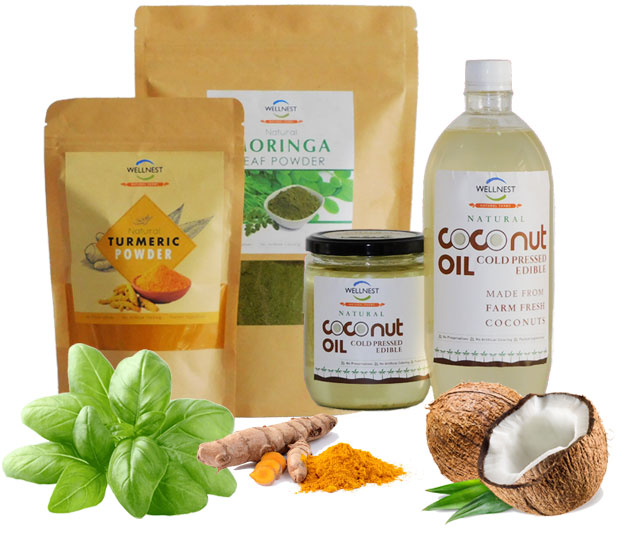

Vision and Mission
Natural farming is our guiding philosophy . We adopt No-till farming in order to infiltrate maximum rain water , stop soil erosion and increase soil fertility.
- Growing more trees and creating an Agrofood forest is our vision
- Creating a Biodiversity through Multi-layer farming is our mission
The Team at WNF is committed fully to produce food that is free of any chemicals,pesticides or fertilizers and make Natural food available to society at large by encouraging more farmers to shift to a more Natural and sustainable model of Farming.
Modern Agricultural Farming v/s Natural Farming
In the recent years most farmers switched to Modern Agricultural farming from conventional farming to cater to the needs of the ever-growing population globally. Farmers were thus forced to develop easier methods, that would yield maximum produce in a smaller area, in the shortest time by using Machines, Chemical Fertilizers, Pesticides and Weedicides as part of the Modern Agricultural methods of Farming.
The food thus produced today, are heavily loaded with pesticides, hormones and other chemicals that are toxic to humans as well as nature. We now encounter the reduction of soil fertility, salinity and alkalinity across farm lands globally. The loss of Natural earthworms, changed the eco-balances of soil microbes drastically resulting in global warming, high cost of capital inputs for farming, ecological imbalances, excessive pollution levels, increased immunity of pests and insects, and the list goes on.
We thought there was an urgent need to change the way we look at agriculture. We adopted Natural Farming methods, also referred to as Vedic farming, a type of farming that used techniques ensuring good, sustainable yields over time in a specific area or region which was a prominent method of traditional Farming for centuries. Growing plants, cultivating crops and rearing animals happened close to human habitation and seeds were sown directly without ploughing. Rotten leaves, poultry and cattle manure, etc., were used to improve soil fertility and when the crop was ready for harvesting, a part of it was left for reproduction. Natural practices consequently, improved soil fertility, conserved water resources with minimal eco-friendly inputs which evolved over time. We educated ourselves on alternatives, and the need to find an approach to protect our farm land, led us to adopting Masanobu Fukuoka’s method of natural farming who said Natural Farming is the future, with the wisdom of the past. We were determined to produce “Chemical free” food for our own internal consumption and also make them available to the society at large.
What is Natural Farming
Natural Farming is a farming technique that encourages farming alongside nature to create a natural biodiversity ,by encouraging the complexity of living organisms ,both plants and animals ,that shape an ecosystem , to thrive alongside food crops. It is an ecological farming approach established by Masanobu Fukuoka, A Japanese farmer and philosopher introduced in his book the “The one-straw revolution”.
The concept of Natural Farming follows four basic principles

No Cultivation
No plowing or turning of the soil. For centuries, farmers have assumed that the plow is essential for growing crops. However non-cultivation is fundamental to natural farming. The earth cultivates itself naturally by means of the penetration of plant.

No Chemical Fertilizer
The soil left to itself maintains its fertility naturally, in accordance with the orderly cycle of plant and animal life.

No Weeding by Tillage
As a fundamental principle weeds should be controlled, not eliminated. A straw mulch as a ground cover is essential to check water evaporation and helps retain moisture in the soil.
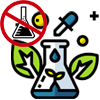
No Dependence on Chemicals
Harmful insects and plant diseases are always present , but do not occur in nature to an extent which requires the use of poisonous chemicals.
How natural Farming is different from organic
Natural and organic are both chemical free farming methods. Both techniques discourage farmers from using any chemical fertilizers, pesticides.
Organic and natural farming methods promote nonchemical and homemade pest control methods.
- Organic farming , as a process, engages with organic fertilizers and manures like compost, Vermicompost, Cow dung, Manure etc. Organic farming is thus more expensive due to the requirement of bulk manures and may have ecological impact on surrounding environments .
- Natural Farming however is a low cost technique that uses neither chemical or organic fertilizers. A farm made Bioculture “Jeevamrutha” is added to the soil instead of any fertilizers to improve microflora of soil. It is made out of cowdung and the cow urine of the desi cow breed. Natural ,farm-made pesticides like Dashparni ark and Neem astra are used to control pests and diseases.
Current Multi layer cropping plantation at farm
We at WNF grow flora and fauna in multiple layers, maximizing the use of every square foot and sunlight with minimum water resources.

First (topmost) Layer
Large Trees like Coconut, Neem, Morninga, Subabul, Teak, Mango, Mahua, Indian Gooseberry, Chakrota (pomelo), BEl / kadamb /jackfruit / Ramphal/ Sita ashok etc

Second Layer
Lemon, Sweet Lime, Custard Apple, Cheeku/Sapota, Guavas, Moringa , Apple /avacado / glycedia / subabul and many such trees

Third Layers (climbers)
Black pepper / beatle leaf / Giloy / shatavar and lots of other Medici I also plants

Fourth Layer
Banana , papaya Toor (arhar dal), tapioca / castor

Fifth Layer
Rice/wheat / millets / vetiver / lemon grass / Perinial veggies and similar structure plants, medicinal herbs, and other vegetables like Cherry tomatoes, Okra, mustard / jeera / fennel / Flax seeds etc.

Sixth Layer
Alfaalfa, Aloe vera, Safed Musli, Stevia/ moong / Urad / horse gram / Bengal gram etc..

Seventh Layer
Turmeric / ginger / elephant yam / sweet potato / safed musli / potato / onion/ garlic

Live stock
Free range cows Free range sheep/ goat Free range country chicken / eggs Honey bees Fish
Natural, Healthy, Nutritious and Wholesome produce
Benefits for Consumers
- Naturally grown fully nourished food with no chemicals and pesticides
- Retaining all the beneficial properties of the crop
- Ecological balancing
- Reduced health hazards with healthier diets
Benefits for Farmers
- Low cost
- Less investment
- Lesser water required
- Crop diversity
- Mixed cropping - higher yields
- Increased government subsidies
Future Dreams
- To encourage as many farmers to adopt to a sustainable model of agriculture, that in turn serves society in large by delivering healthier products in a sustainable global environment
What makes us different
We thought there was an urgent need to change the way we look at agriculture because most of the food produced today is heavily loaded with pesticides, hormones and other chemicals that are heavily toxic to humans and nature. On top of that, preservatives and other chemicals added to food sold in stores which make store-bought food even more toxic. A population explosion, led farmers on a quest to develop easier methods, that would yield maximum produce in a smaller area, in the shortest time. Hence the use of Machines, Chemical Fertilizers, Pesticides, Weedicides paved the way for Modern Agricultural methods of Farming. We now encounter the reduction of soil fertility, salinity and alkanity across farm lands globally. The loss of Natural earthworms, changed the eco-balances of soil microbes drastically. Global warming, high cost of capital inputs for farming, ecological imbalances, excessive pollution levels, increased immunity of pests and insects, and the list goes on.
We wanted to make a honest and sincere attempt to produce “Chemical free” food for our own internal consumption and also make them available to the society at large.
We adopted Traditional Agriculture, also referred to as Vedic farming, a type of farming that used techniques ensuring good, sustainable yields over time in a specific area or region which was a prominent method of Farming for centuries.
Growing plants, cultivating crops and rearing animals happened close to human habitation and seeds were sown directly without ploughing. Rotten leaves, poultry and cattle manure, etc., were used to improve soil fertility and when the crop was ready for harvesting, a part of it was left for reproduction. Natural practices consequently improved soil fertility, conserved water resources with minimal eco- friendly inputs which evolved over time.
We educated ourselves on alternatives, and the need to find an approach to protect our farm land, led us to adopting Masanobu Fukuoka’s method of natural farming who said Natural Farming is the future, with the wisdom of the past.

We are NPOP certified natural farm and also certified by India Organic
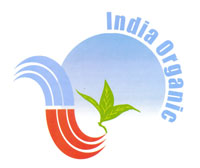


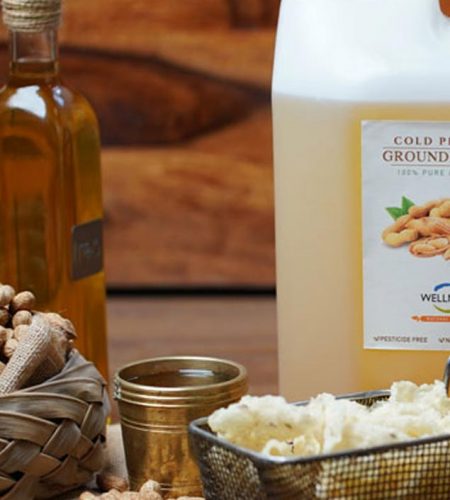
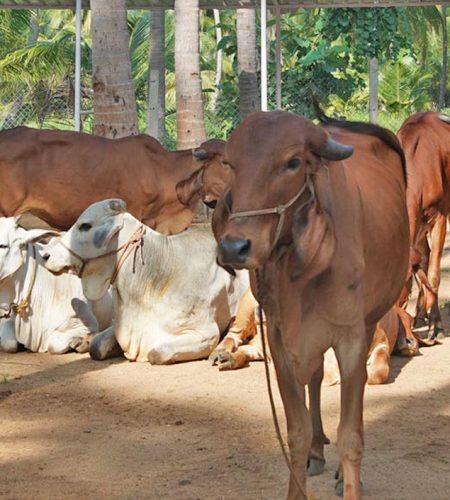


Certified Products
Sustainable, Not mass produced
Carefully selected natural products form WellNest Natural Farms
- Dairy Products
- Cold Pressed Natural Oils
- Natural Edible Powders
- Natural Honey Bee Products
- Das and Cereals
- Pesticide Free Fruits

